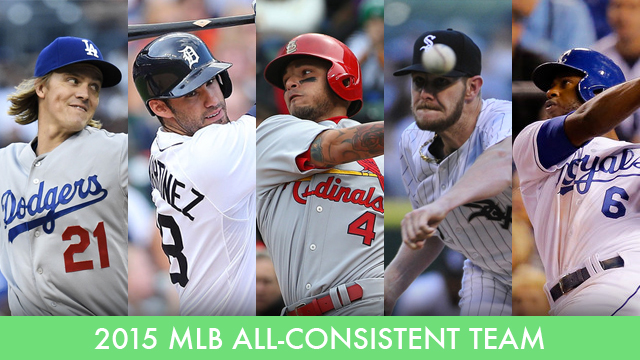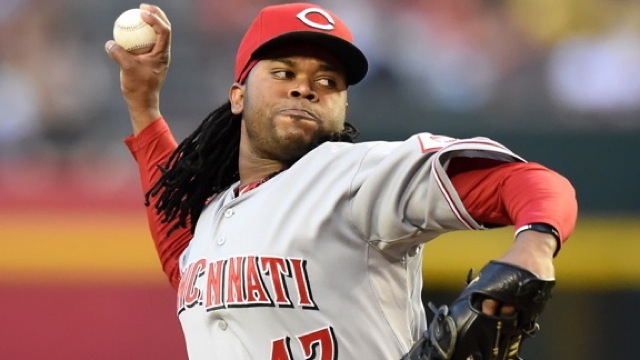When playing 50/50’s, Double-Ups, or Head-to-Head games, you want to dial down variance by building a safe lineup with consistent hitters—those who produce points on a regular basis at the lowest possible price.
I went through hitter stats in the first half of the MLB season, looking for players that regularly scored points. On sites like FanDuel, where outs cost a batter minus 0.25 points, it makes a big difference if a player can be consistent in bringing his ‘A’ game every day out. [Click here for quick example].
So today, we’re giving you the high floor players. We’ll call this the MLB “All-Consistent” team.
2015 MLB All-Consistent Team for FanDuel Cash Games
These are the players that consistently get on base in the most games, despite being relatively cheaper in price than their PPG counterparts. They are better plays in 50/50 games than GPPs.
INFIELD
Yadier Molina, C, St. Louis: He’s getting a bad rap for not flashing much power this season (or last season), but he still posts a top-five batting average for catchers, and he has posted positive FanDuel points in 65 of 82 games this season. Only Buster Posey and Stephen Vogt have more positive point games this season among catchers.
Alternate: Francisco Cervelli, C. Pittsburgh
Adam Lind, 1B, Milwaukee: His salary started out low, with expectations that he’d miss hitter-friendly Rogers Centre in Toronto, American League pitching and the DH spot. But instead, he’s among the HR leaders at first base with 15, and his 71 positive FD games rank tied for fourth at the position.
Alternate: Kendrys Morales, 1B, Kansas City
Logan Forsythe, 2B, Tampa Bay: The Rays traded Alex Torres and Jesse Hahn to San Diego in January 2014 for a package that included Forsythe and Brad Boxberger. Forsythe was thought to be a handy utilityman, but now he has turned into one of their most important hitters, batting in the heart of their order. His low salary bumps him past Joe Panik for this spot.
Alternate: Joe Panik, 2B, San Francisco
Manny Machado, 3B, Baltimore: There are only a few third basemen with more home runs than Machado (19), only a few have a higher batting average (.298), and a handful have higher average salaries this season ($3,565). But no third baseman has more positive-points FanDuel games than Machado (75).
Alternate: Trevor Plouffe, 3B, Minnesota
Erick Aybar, SS, L.A. Angels: I was as surprised as you to see this name here! But Aybar has picked it up since a quiet April (.222 BA, 0 HR, 8 RBI, 4 Runs), and no shortstop has scored positive FanDuel points in more games this season (68). He’s also second at the position, behind Alcides Escobar, with 45 runs scored.
Alternate: Xander Bogaerts, SS, Boston
OUTFIELD
Among the outfielders, the only one to come close to Mike Trout and Bryce Harper is Jose Bautista, but we’re going to look a little farther down the list for cheaper plays for our All-Consistent Team!
J.D. Martinez, OF, Detroit: Batting in the heart of the Tigers’ lineup is a great place to be, and Martinez has posted 70 positive FanDuel games, with just 13 games with fewer than zero points.
Lorenzo Cain, OF, Kansas City: Another outfielder from the AL Central, Cain provides better speed than power numbers, but only six outfielders (including Martinez, Trout and Harper) have scored more runs (54). Amazingly, he has just 10 games (out of 76) in which he’s scored zero or fewer FanDuel points. Just five outfielders are averaging more FanDuel points (3.31), while 32 outfielders have higher average salaries.
Nick Markakis, OF, Atlanta: If it’s true that chicks dig the long ball, then they are definitely not fans of Markakis, who has zero homers this season. But DFS chicks dig winning, so they’re happy to know that Markakis has 71 games with positive FanDuel points, even thought he’s averaging just 1.97 FD points per game.
Alternates: Jay Bruce, OF, Cincinnati; Curtis Granderson, OF, N.Y. Mets; Kevin Pillar, OF, Toronto
PITCHERS
Pitchers, of course, are a much different story on FanDuel, as they don’t often post negative points–and if they do so regularly, you and their MLB team aren’t using them anyway. So I chose the following pitchers by looking closely at quality starts (minimum of 6 IP, no more than 3 ER), which comes out to 3.0 FanDuel points, not including points for strikeouts or wins.
Zack Greinke, Pitcher, L.A. Dodgers: It’s Greinke on this list and not his counterpart Clayton Kershaw. His average salary on FanDuel ranks 10th, and his 13.46 FanDuel points per game ranks him 11th. But the National League starting pitcher in the All-Star Game is our starting pitcher, too, with just three games of more than two earned runs allowed (Scherzer had four).
Max Scherzer, Pitcher, Washington: There’s a reason Washington (and DFS players) paid big bucks for Scherzer. With eight games of nine or more strikeouts this season, Scherzer remains one of the most expensive pitchers you can choose. But you have to pay up for pitching on FanDuel.
Chris Sale, Pitcher, Chicago White Sox: Sale pitches in a hitter’s park, which is scary to many DFS players, but he has 10 games with at least 10 strikeouts this season. And only four regular starting pitchers have a higher percentage of quality starts this season than Sale (82%).
Alternates: A.J. Burnett, P, Pittsburgh; Gerrit Cole, P, Pittsburgh; Carlos Martinez, P, St. Louis



